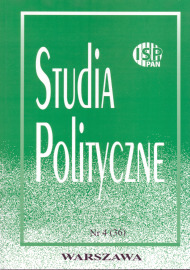Losy Polskiego Stronnictwa Ludowego "Nowe Wyzwolenie" po wyborach parlamentarnych w 1947 roku w świetle sprawozdań władz wojewódzkich PPR i PPS
The history of the Polish People’s Party “New Liberation” after the parliamentary elections in 1947 in the light of reports by the authorities of the Polish Socialist Party and the Polish Workers’ Party
Author(s): Tomasz SkrzyńskiSubject(s): Politics / Political Sciences, Political history, Electoral systems, WW II and following years (1940 - 1949)
Published by: Instytut Studiów Politycznych PAN
Keywords: Polish People’s Party; New Liberation; Polish Socialist Party; Polish Workers’ Party; Edward Osóbka-Morawski; Stanisław Mikołajczyk
Summary/Abstract: In the spring of 1946, a small part of the Polish People’s Party leaders decided that in the wake of communists’ position, determination and ruthlessness, there was no point in being a part of the opposition. After they were secluded from the legal opposition they established a new political party. They did not identify themselves with the PPP’s program, they believed to be a party which was in between the opposition and the government. The peasants believed them not to be credible.The communists used the new party called the Polish People’s Party “New Liberation” to weaken the independent peasant movement, whereas the socialists used it to strengthen their influence in the countryside. The scale and consequences of the conflict in the state management of the party, reluctance of most members towards the communists’ regime combined with high hopes for a political success of Polish Socialist Party over the Polish Workers’ Party put the party in negative light, as perceived by the communists since February 1947.In the face of the pressure from the Polish Workers’ Party and the concessions that the socialists made, most of PPP’s “New Liberation” members decided either to defect to the People’s Party, to return to the PPP, or to withdraw completely from political activity. Taking into account the range of the party’s actions, it could be regarded as a foundation of a party which had no chance of transforming itself into a mass political party.
Journal: Studia Polityczne
- Issue Year: 2014
- Issue No: 36
- Page Range: 35-55
- Page Count: 21
- Language: Polish

